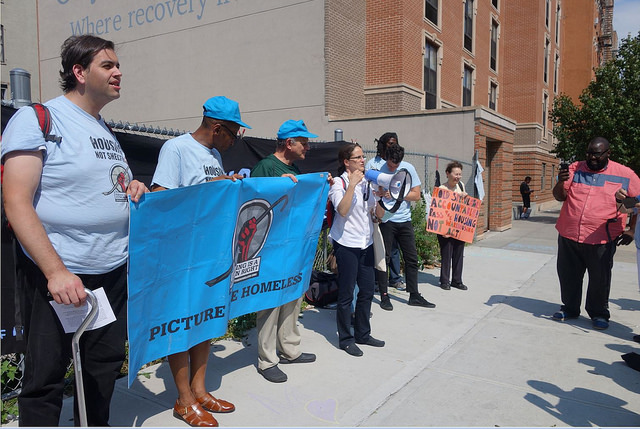Kazembe Balagun, Project manager at Rosa Luxemburg Foundation.
“Lorena Zarate of the Global Platform for the Right to the City joins with local homeless organization Picture the Homeless for an action calling for the creation of community land trusts on vacant land in East Harlem.
To give you a sense of the necessity of raising a call to a Right to the City in a place like the United States, it is important to note that, despite a rising housing crisis in the cities and a major foreclosure crisis that saw 9.3 million Americans lose their homes, none of the major presidential candidates focused on the issue of housing in their political platforms. Current President Donald Trump has snubbed cities by naming a former surgeon as housing chief and his former party planner as regional housing manager for New York, the location of the country’s largest stock of public housing.
Even in a difficult environment, Right to the City activists have more opportunity and potential than ever before to transform the urban landscape. One clear opening is the popularity of the notion of cities as “Sanctuaries.” While this term originally referred to the defense and right to stay of immigrants, activists are using this space to expand sanctuary to include promoting rent control, strengthening public transportation and ensuring racial justice for all inhabitants. And with the rise of progressive mayors in places like Jackson, Mississippi connecting with their counterparts in cities like Barcelona, we are witnessing international solidarity in real time.
The recent meeting of the Global Platform in New York showed the impact and importance of coordinated action and advocacy efforts. Similar to the successful efforts to assert the Right to the City within the United Nation Habitat III process, advocates in North America have been building consciousness around the Right to the City through a “Renter Nation” campaign, which builds bridges between rural and urban communities and connects various communities across the US and Canada around racial and housing justice.
As the Global Platform continues to develop, the issue of displacement must be addressed by both holding states accountable to international mandates as well as developing local initiatives to decommodify housing and strengthen the collective rights of inhabitants.





